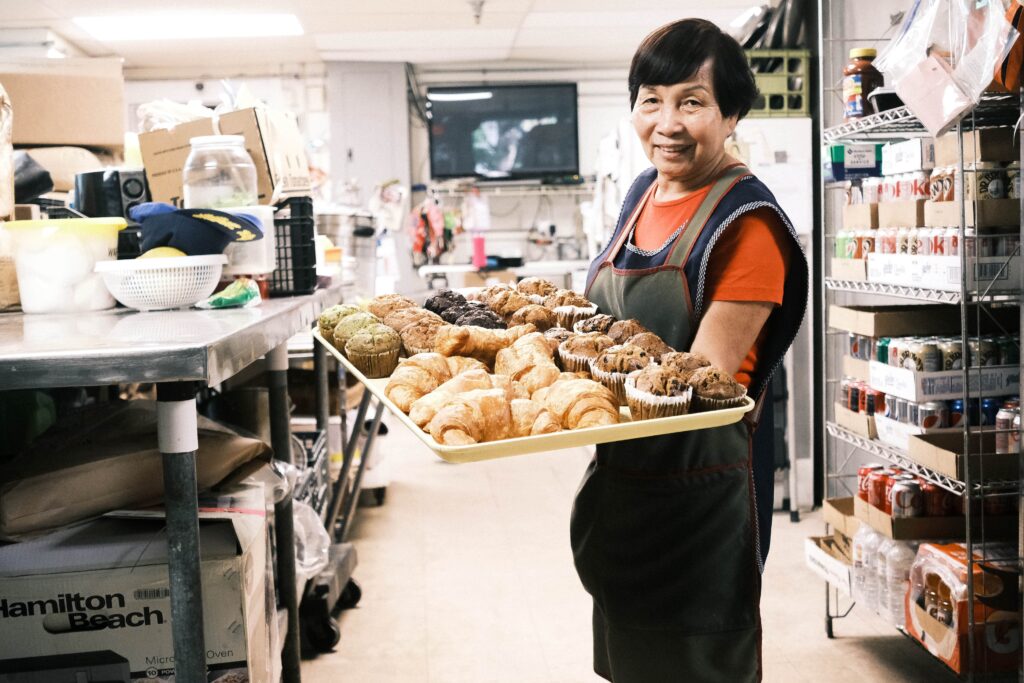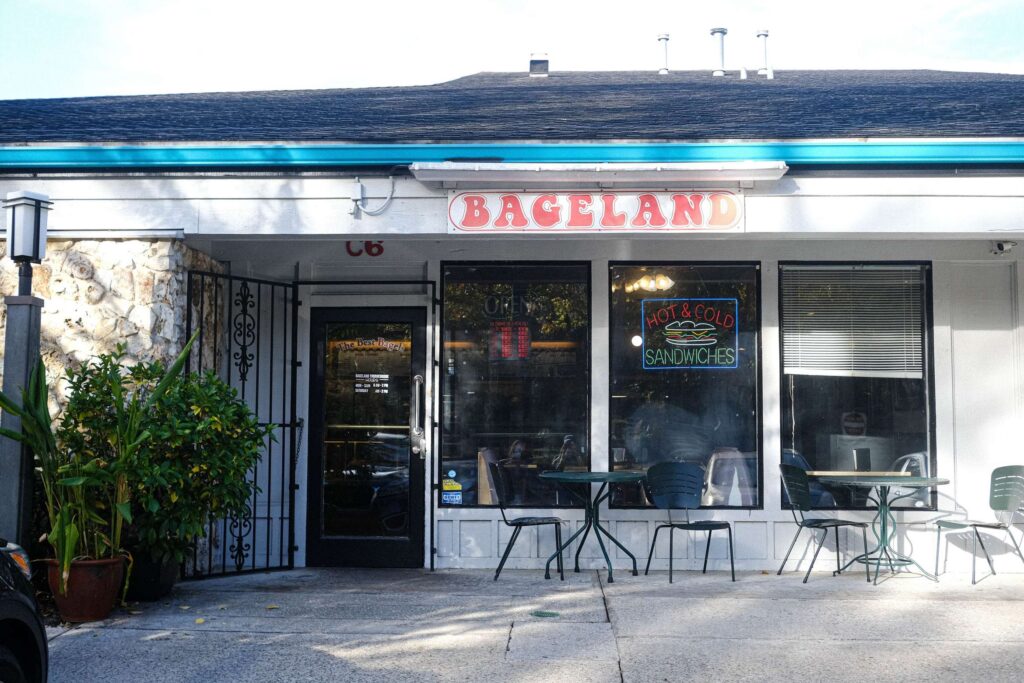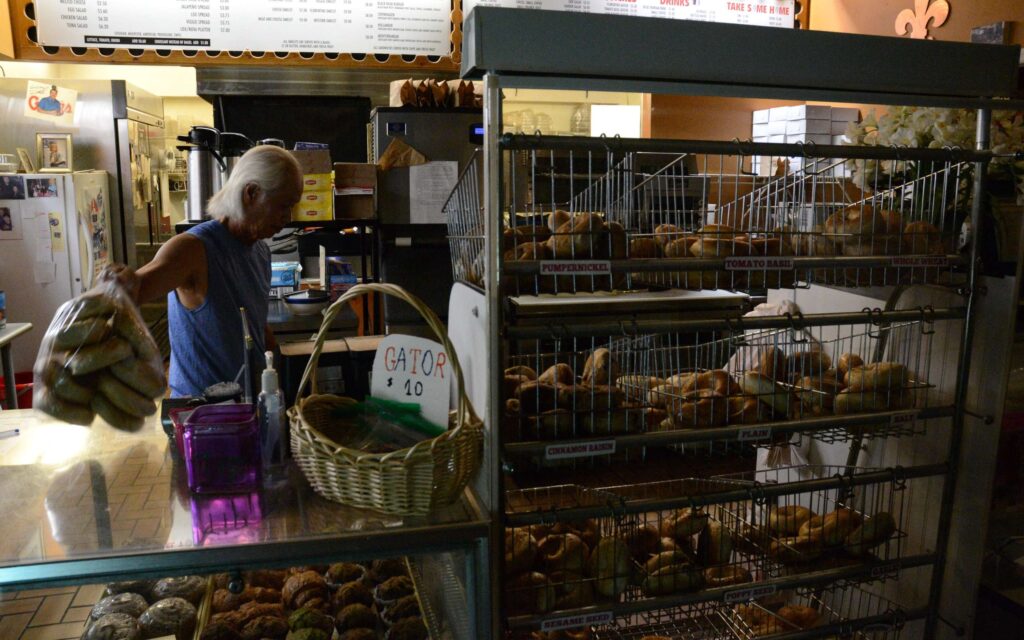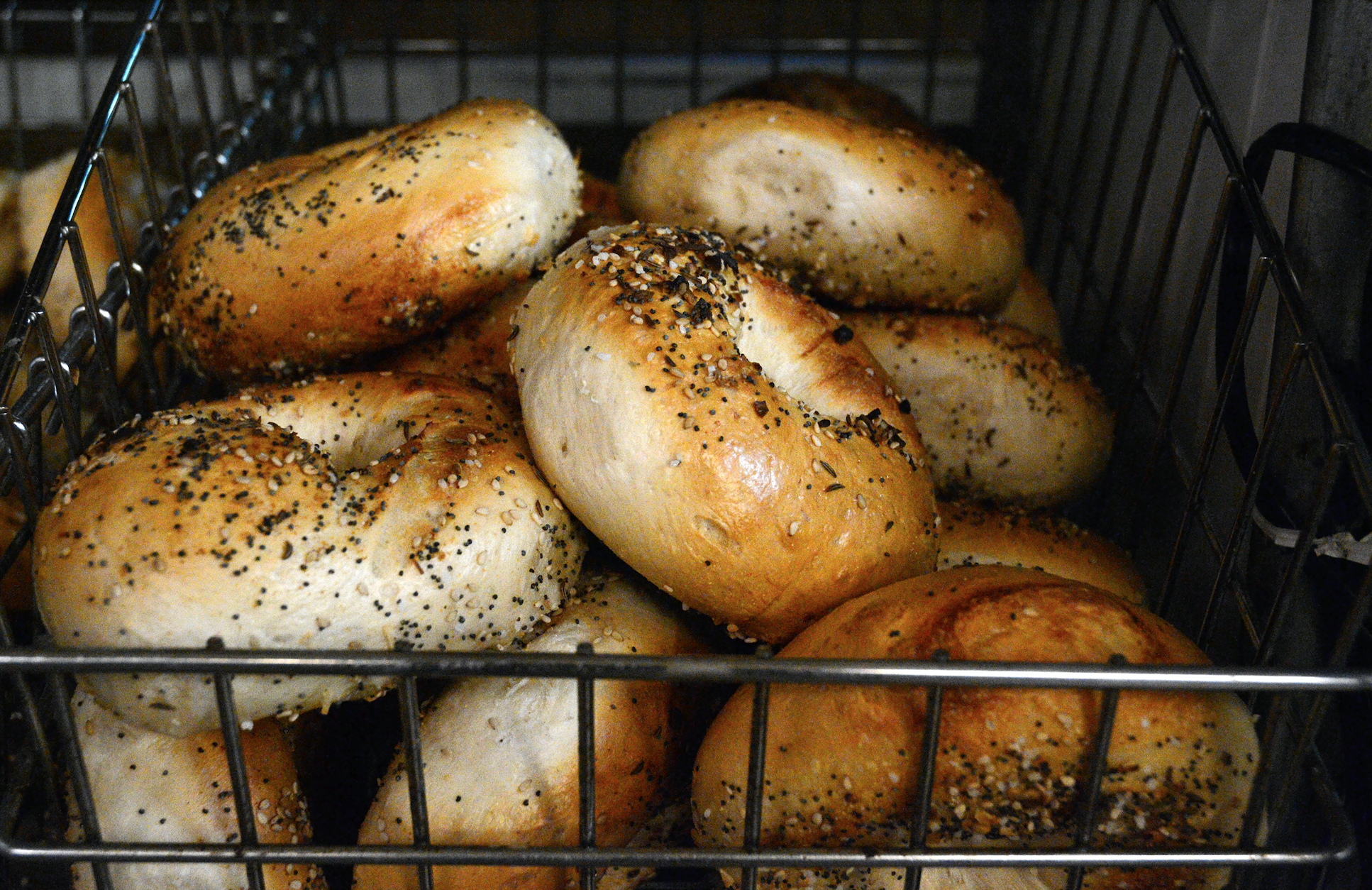A Gainesville eatery gave a Laotian family and their customers a sense of community

Debbie Phimon, 68, transports a tray of pastries she bakes in Bageland’s kitchen. (Apoorva Thapa/Atrium)
December 6, 2021 | Story by Julián de Sevilla
On vacation in October 2007, Malay Phimon visited New York’s Metropolitan Museum of Art with her daughter Jasmine. A man bumped into her while she waited for Jasmine outside the bathroom. She recognized him, one out of 4.5 million people who visited the museum that year. She didn’t know his name, but she remembered his order: a toasted everything bagel with cream cheese.
She left the museum and walked to a bus stop. A man in line to board didn’t have change for the fare. Malay offered to pay for him, and when he turned around, it happened again. A cinnamon raisin bagel, though he switched it up from time to time. Before her stood Hunt Davis, another one of her regulars. What were the odds?
It happened on the street in Las Vegas, too, and it happens constantly at home in Gainesville. Malay, 47, sees a face and remembers a corresponding bagel.
After nearly four decades behind the counter at Bageland, the Gainesville restaurant her parents have owned and operated since 1980, her mind is a database of past and current customers. Many of them eat there several times a week and have done so for years. In many cases, Malay knows them by their names. She knows about their jobs and their families. She didn’t mean for this to happen. People just keep coming back, and as she’s noticed, they tend to order the same thing. And they like to talk. After a while, these things stick.
A lot has changed about Bageland over the years, but a lot has stayed the same. The restaurant has had four different locations around Gainesville. During a dizzying stretch in the ‘90s, all four were open at once. The only one that remains is in a shopping plaza in Northwest Gainesville. Since the beginning, they’ve sold bagels rolled by an enormous, ancient machine in the kitchen, then boiled and baked every morning by J.T., Malay’s father. Along the way, they introduced deli sandwiches and eggs, along with house-made croissants, muffins and quiches, all made by Debbie, Malay’s mother.

Bageland has had four locations around Gainesville. The one that remains is in a shopping plaza in northwest Gainesville. (Apoorva Thapa/Atrium)
The most significant change to Bageland’s menu came unexpectedly in 2005. Malay and Debbie were eating lunch they’d brought from home when a customer approached them.
“This lady came up to us and she’s like, ‘I want that.’ We thought she was joking. She yelled at us.”
The entitled customer’s ire inspired Debbie. She brought some of the dishes she learned from her mother to Bageland and served them to customers for free. They quickly became a staple. Now, every Tuesday and Thursday, Bageland sells green curry with rice, shrimp wonton soup with roast pork and pho ga, a Vietnamese chicken soup with rice noodles. The dishes are aromatic and comforting, prepared in Bageland’s kitchen exactly as they are in Debbie’s home, down to the kaffir lime she grows in her garden.
I’m outside Bageland one day in early October. Debbie, 68, sees me before I have a chance to ring the doorbell. She lets me in with a sleepy greeting and offers me coffee. It’s 4 a.m., and the warm light from Bageland’s kitchen is all that cuts through the dark. Debbie is already wearing the green smock apron she’ll wear for most of the day. She’s small in stature and wears her black hair in a short bob. Knee surgeries have slowed her down, but she won’t stop moving for many more hours.
Shuffling determinedly, she leads me into the kitchen where her husband waits for the boiler and oven to heat up. He’s wearing sandals, black shorts and a blue sleeveless shirt. His white hair reaches almost to his shoulders — this is the first time I’ve seen him without a cap on. J.T., called Phimon by friends and customers, flashes a toothy smile.
“Hey, man!” He didn’t think I’d show up. The stainless-steel boiler is in the back of the building behind the oven. Both machines are humming, and the water in the boiler rumbles gently, a haze of steam floating in the air above it.
He slips on yellow rubber gloves and grabs a ceramic tray of 24 uncooked bagels from a rack in front of him. They’ve proofed overnight in the refrigerator. He slides them gently into the steaming water and waits for each one to float, then just a few seconds longer before scooping them out with the biggest strainer I’ve ever seen. He lays them on rectangular boards, four to a board, and sprinkles them with sesame seeds. The boards are transferred behind him to one of the racks that rotate through the oven like a fiery Ferris wheel. A small, yellowed photo of Debbie is pinned to the side of the oven next to a business card and some disposable masks. Once the bagels have made a full lap, he flips them. One more lap and they’re done, emerging golden, shiny and fragrant.

A decades-old polaroid photo of Debbie Phimon hangs in the Bageland kitchen. (Houston Harwood/Atrium)
At 75, he could do this in his sleep. He tells me he’s never burned his hands. Wednesdays are slow, so there’s only about 10 trays of bagels to work through. His workday is done before the sun rises. He then goes to the gym with Debbie around 5 a.m. and is back an hour later to sit around and talk to the customers he’s known for years.
Meanwhile, Debbie hustles about the kitchen, prepping the rest of the day’s food. On Tuesday and Thursday mornings, this includes roasting chicken bones for the broth simmering all day to form the base of the pho and wonton soup. She takes a moment to bring me a scrap of leftover croissant dough she baked, just out of the oven. It’s glossy and crisp, wrapped in a piece of parchment paper. Delicious.
“Try it! Fresh, like that? It’s not like anything else,” she says proudly. “Do you want more coffee?”
Bageland doesn’t have an Instagram account. It doesn’t sell merchandise. The website on its business card doesn’t exist anymore. Its coffee costs $1.20 and is served one way: hot, in one of a few dozen mismatched mugs it has accrued over the years. It’s also one of the oldest restaurants in Gainesville, but as ever in this industry, it could all disappear at any time.
The kitchen is enormous. Two industrial mixers sit in a corner, flanked by stacks of 50-pound bags of flour and the machine that rolls out bagels. Shelves are crammed full of ingredients and spices. Scattered throughout the space are bits and pieces of the family’s history: a small white and pink rice cooker, the kind you’re more likely to find in someone’s house. Photographs pinned to the sides of doorways or tucked into corners of tables. Pamphlets from the Catholic church nearby. Bits of receipt paper where they’ve scribbled a reminder of a forthcoming doctor’s appointment. I get the sense that this is a room of their home.

Bageland’s kitchen is enormous. Shelves are crammed full of ingredients and spices. (Apoorva Thapa/Atrium)
The dining area, on the other hand, is a room of ours. During the day, tall windows next to the entrance fill the space with light. In the corner by the door sits an old, lightly tarnished gumball machine. Aging booths line the room’s border, with tables and chairs arranged in rows in the middle. The radio plays softly from old speakers near the sloped ceiling. In the back corner is a counter with a water cooler, condiments and cream and sugar for coffee. On the wall above it are more family photos and a large wooden sign they’ve had since 2006, when they closed the original Bageland on NW 1st Avenue. Back then, the sign thanked their customers for “31 years,” but every year since, they’ve adjusted that number by writing it on a slip of paper and taping it over the sign. It now reads 46.
There’s a photo of Bill Dolbier and his friends on the wall near that old sign. He’s been eating at Bageland since the late ‘70s, when he was an assistant professor of chemistry at the University of Florida. The original location was a short walk from campus, and he was one of many faculty members who frequented it. He remembers fellow professors hosting office hours in corner booths at the restaurant.
“The proprietors were friendly,” he said, “The prices were right. The food was good. What was not to like?”
He stopped bringing lunch from home, knowing that most days would inevitably lead him to Bageland. Now 82 and retired, he comes in almost every day and meets the same group of friends for lunch every Friday. Since the start of the pandemic, they have been hesitant to sit indoors in a group, so every Friday morning, J.T. sets out tables, chairs, umbrellas and a makeshift coffee station for them on the small patio behind the restaurant. He does this just because they asked him to.
Linda Phelps, 61, worked at Bageland as an undergraduate student in the early ‘80s. Excitedly, she reminisced over the phone: She got to work around 5 a.m. most days, loading bags of bagels into a tiny Mazda pickup truck and delivering them around town “before Gainesville even woke up.” She remembered catching her bosses napping on sacks of flour in the mornings. She liked the job enough to keep working there for a while after graduation, and J.T. and his family were the reason.

J.T. preps the storefront each business day well before the sun peaks above the horizon. He often exercises at a nearby gym after boiling the daily batch of bagels. (Houston Harwood/Atrium)
“He took me to buy my first car,” she said. “A very used Dodge Charger. Maroon with a white top. He had me to his house for dinner with his family. He was an unbelievably good person. He was always smiling. He worked so hard.”
Josh Sharpe, 29, first came to Bageland on his lunch break one Tuesday last spring. He let it slip to Debbie that he loves spicy food, and the next time he came in, she had a bottle of hot sauce waiting for him, made with peppers from her garden. She did this for him without knowing his name. He’s been back at least once a week ever since.
When I asked Debbie about that, she recalled their early years in Gainesville, when there wasn’t space to grow anything in their tiny apartment. A neighbor let her take as many peppers as she wanted from the plants in his yard. That generosity repeats itself, decades later, on Sharpe’s plate. The sauce was spicier than he expected. Now, she puts some on the side for him.
The Phimons arrived in Gainesville as refugees in 1975 after fleeing their home in Laos following the end of the Laotian Civil War. J.T. worked for Air America, an airline covertly operated by the CIA across Southeast Asia, which made him a target of the authoritarian regime that had taken control of the country. Their sponsor was from Gainesville, so that’s where they went.
Finding work as Asian refugees who spoke little English was difficult. The couple found jobs where immigrants have been quietly welcomed, if not appreciated, for generations: a dish pit. In this case, it was that of Leonardo’s By The Slice, a fledgling pizza spot on University Avenue. Later on, J.T. picked up a night job as a custodian at UF. Like this, the Phimons made ends meet.
The owner of Leonardo’s, Steve Solomon, took note of their work ethic. Debbie was soon promoted to manager of Leonardo’s. In 1980, a shop called Bageland across from UF’s campus was for sale. Solomon asked J.T. to partner with him in buying it. He helped J.T. secure a loan. Five years after leaving his home, J.T. was a business owner. Solomon and J.T. were partners, eventually expanding to three other locations, until they split in the ‘90s. Solomon couldn’t be reached for comment, but J.T. said they remain friends.
“I don’t want to make enemies with anybody,” he said. “Making enemies is easy, but making friends is harder. That’s why I keep going.”
One afternoon in late September, I spoke to Malay in a booth at Bageland. A while into our conversation, Debbie walked over and placed a plastic bag in front of me. She interrupted her daughter — it was leftover rice and green curry chicken for me to try. Debbie knew I had already eaten lunch because she’d served it to me herself an hour earlier. Malay smiled, rolling her eyes, while her mother walked back to the kitchen to finish closing up. Malay is taller than her mother, but she has a similarly rounded face and long black hair pulled back in a ponytail. She wore denim shorts and a Bageland T-shirt, the back of which reads “Billions and billions of bagels.”
Malay’s upbringing included all the trappings of a third culture kid: a child experiencing one culture (American) in the world outside, while being raised within the norms and expectations of another (Laotian). She learned to speak English by watching “Sesame Street,” “The Electric Company” and “Mister Rogers’ Neighborhood.” Malay won’t say how old she was when she started working at Bageland, but it’s clear that she carried tremendous responsibility at a young age. As the older sibling, she “had to take care of everything.”
She’d go to work at 5:30 or 6 a.m. to help open the restaurant, then go home and make sure her younger sister, Pone, was fed and dressed before they walked to school together. She cleaned their house and made sure dinner was ready when her parents got home.
It’s just hard work. We were willing to put in the hours to make sure everyone feels at home.
– Malay Phimon
Bageland is the only job Malay has ever worked. After graduating from Buchholz High School in 1991, she started working for her parents full time. She has trained virtually every employee who has worked for Bageland in the last 30 years. She’s had to run the place by herself many times over. Jasmine, her daughter, was born in 1998.
“I never wanted to raise my daughter in the business,” she said. “I didn’t want her to go through what I went through.”
Jasmine worked at Bageland in high school, but elected to do so on her own. Compared to her own childhood, Malay took a decidedly hands-off approach to motherhood, determined to give her daughter the freedom she never had. When Jasmine wanted to try cheerleading, Malay signed her up. When she decided she wanted to play softball, she paid for Jasmine to join a travel softball league, though Malay often couldn’t leave work to take her daughter to practice. As Jasmine got older, they were both so busy that most of the time they spent together was at work in Bageland’s kitchen.
“I had to work to make sure she got what she wanted,” Malay said. “That’s just how it had to be.”
Malay knows her sacrifice paid off. Jasmine is now in her final semester of law school.
“She’s good,” Malay said with a confident smile. “I don’t have to worry about her.”
Malay calls the end of 2006, when the original Bageland location closed, one of the saddest times of her life. The lease for the storefront at 1717 NW 1st Ave. was taken over by Goerings Textbooks, which leased the space to an ice cream shop instead. They were given just a few weeks to vacate the space. She declined to elaborate on the details, citing only “bad blood.” At the time, Goerings co-owner Tom Rider told The Gainesville Sun that the area needed “more energy.” He added, “We’re beginning to feel there aren’t too many years left for the kind of retailing we do in this neighborhood.” Today, that storefront is occupied by a tutoring service called Study Edge.
These days, Malay comes to work at 5 a.m. to relieve her parents and finish opening the restaurant. She arrived quietly on the morning I watched J.T. bake bagels. She greeted me with a smile, not at all surprised that I was there, and started cutting fruit.


J.T. says his daughter is the driving force behind Bageland’s pastries — and he is the master of bagels. (Houston Harwood/Atrium)
On any given day, she is likely to see far more familiar faces than strange ones. They’re all “like family.” She often finds herself surprised when a group of people she doesn’t recognize approaches the counter. I asked her why she thinks her family’s business has lasted so long.
“It’s just hard work,” she said. “We were willing to put in the hours to make sure everyone feels at home.”
Calling it “hard work” is an oversimplification. For almost half a century, her family has stewarded a space where their community is fed and cared for. Malay described delivering food to regulars or helping older customers with yard work or grocery shopping like that was just any other part of the job.
Running a restaurant is a risky and draining undertaking, even for those who do so without the painstaking dedication to goodwill the Phimons insist on. They routinely go above and beyond what anyone could expect of them. It appears effortless, but the experience of eating at Bageland exists because Malay, Debbie and J.T. Phimon have spent their lives working for it, with the help of a few dozen employees over the years. I suggest that none of that is necessarily part of her job description.
“Maybe. Yeah, we try to help everyone out,” Malay said. “We came to America with nothing and so many people helped us. So it’s our time to, if we can, do the same for other people.”
Many times in our conversations, Malay told me she was tired. It’s an exhaustion unique to the restaurant industry, where recently, long hours, low pay and a relentless pace have driven workers to find work elsewhere in droves. In a recent survey by Joblist, 38 percent of former hospitality workers reported that they aren’t considering a job in hospitality for their next position. Of those currently looking for work, 69 percent said nothing would make them change their mind about leaving the industry. Malay is of a similar mindset.
The space in which Bageland operates is now for sale. When her parents brought up retirement and asked her to take ownership of Bageland, Malay declined without hesitation. Instead, she offered a deadline: She will retire on her 50th birthday, whether or not the space has sold, and Bageland will close for good.
“I need to enjoy my life,” she said. “I’ve given 100 percent to this place.”
When I asked what her plans are after the shop closes, her demeanor changed. Her smile widened and she looked up above my head as she spoke. She will finally leave Gainesville, she said, and relinquish the responsibility that shaped so much of her life. She plans to travel alone in the Toyota 4Runner she bought for exactly that purpose. She rattled off destinations as though she were reading from a Christmas list: Murfreesboro, Tennessee; Mackinac Island, Michigan; Chicago; Dallas. People she loves live in those cities, some of whom started out as customers or coworkers. She misses them. She’ll figure everything else out later.
This is a beautiful story and wonderfully written. I have even more respect for a family & institution that has fed me & mine for many years. Thank you all.